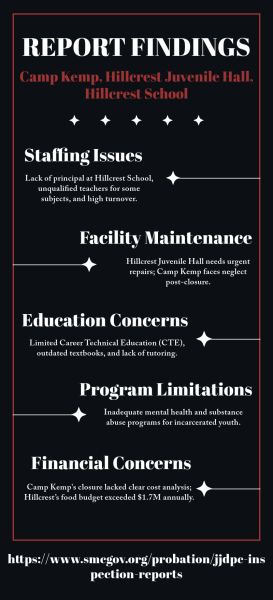
Jiya Venkatesh
The Hillcrest Juvenile Hall is located at Paul Scannell Dr. The 2024 annual inspection report noted that in the past, students stayed in Juvenile Hall for short periods, but due to changes in admission policies as of July 1, 2023, many youth will now be detained longer. "We have heard for a long time that the food is pretty disgusting, and that the kids often go hungry," said Rebecca Kieler, a member of In Our Care San Mateo.
In San Mateo County’s Juvenile Hall, concerns have arisen over the quality and cost of meals provided to detained youth.
The Youth Services Center (YSC), a juvenile detention facility opened in September 2006, includes living units, a school, medical services, and recreational spaces. It has a capacity of 180 youth but housed an average of 64 detained youth a day in 2018.
“The food is horrible, and it’s being made at the county jail for the outrageous cost of $89 per meal,” said Johanna Rasmussen, the chair of San Mateo County’s Juvenile Justice and Delinquency Prevention Commission (JJDPC).
Since 2021, meals have been prepared off-site at the San Mateo County Jail, transported to the juvenile facility the following day, and reheated before serving.
According to In Our Care, a San Mateo nonprofit focused on juvenile justice, this change has led to numerous grievances from children regarding hunger and insufficient food portions. In some cases, medical staff have been asked to prescribe additional food, such as peanut butter and jelly sandwiches, to address ongoing hunger complaints.

Concerns over food provisions are just one aspect of broader oversight efforts. Recently, the Juvenile Justice Commission released its annual inspection reports on juvenile facilities in the county. Responsible for safeguarding the rights and well-being of detained youth, the commission evaluates facility conditions, treatment programs, and overall youth welfare to ensure proper care and compliance with established standards.
In their annual report of the Hillcrest School in the juvenile hall for 2024, the commission noted that San Mateo’s Court and Community Schools are currently experiencing a second consecutive year without a principal. Notably, some teachers with single-subject credentials are teaching subjects outside their authorized area.
Financially, the cost of incarcerating each youth in San Mateo County is significant. According to the Board of State and Community Corrections, in 2017-2018, the annual operational cost per juvenile hall was reported at $20,294,451.
“People who spend 10 years in prison rarely come out a better person,” said Redwood City resident Ben Gross.
Addressing the food issues, Assembly Bill 802 (AB 802) has been introduced in the California Legislature. Authored by Assembly Member LaShae Sharp-Collins, this bill mandates that juvenile justice commissions in all 58 counties conduct surveys with detained youth about their experiences with food and hunger within these facilities.
As of March 10, AB 802 has been referred to the Committee on Public Safety.
“The community wants to feel safer, and they want the government to be accountable. Statistics show us that rehabilitation and restorative justice are what bring down recidivism,” said Rebecca Kieler, co-founder of In Our Care SMC. “Some of what goes on at the youth service center is what you would consider punitive punishment, not restorative rehabilitation. And that includes the food.”
